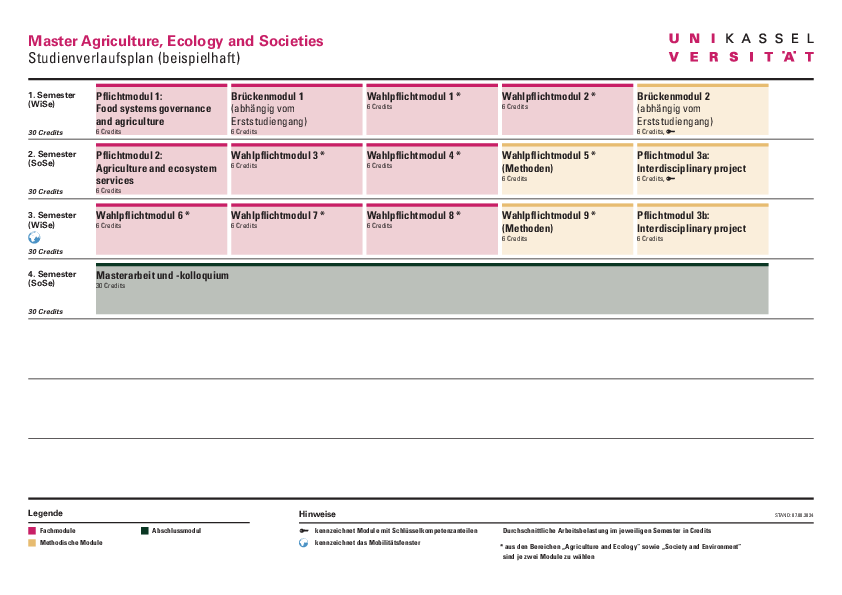Studienaufbau
Während des zweijährigen Masterstudiums müssen 120 Credits absolviert werden, aufgeteilt in:
- Agriculture and ecosystem services
- Food systems governance and agriculture
Für Studierende mit naturwissenschaftlichem Grundstudium:
- Research methods in social sciences
- History, societies and environment
Für Studierende mit sozialwissenschaftlichem Grundstudium:
- Research methods and data science in the life sciences, und
- entweder Priciples of organic farming oder Soil and plant sciences oder Organic livestock farming under temperate conditions
In Kleingruppen arbeiten die Studierenden an Forschungs- und/oder Transformationsprojekten zu konkreten Problemen des europäischen Ernährungs- und Agrarsystems und seiner globalen Verflechtungen. Jedes Projekt wird von zwei Lehrenden aus verschiedenen Disziplinen betreut.
Jedes Jahr werden unterschiedliche Projektthemen und -formate angeboten. Diese können auch gemeinsam von Studierenden und Dozenten entwickelt werden. Einige Beispiele:
- Colonialism, food culture, history and sustainability of rice cultivation in Africa.
- What is 'sustainable'? Conceptual developments between cultural histories & the natural sciences
- Transformation(s) of animal husbandry and human-animal interactions
- Food culture, animal welfare and animal ethics in the Ahle Worscht cluster in North Hesse
- The thawing permafrost of Siberia: Potentials and risks of agricultural development
- Organic agriculture and agroecology in North Africa: From competition between cash crops and agroecology to compatible systems?
- Impact of the new European conformity rules on third countries in the context of the reform of the organic farming regulation
- The German Supply Chain Act and its impact on the Global South: The example of Indonesia
- Alternative food networks and local context: historical and socio-economic comparisons between the EU and North Africa.
- Agroecological innovation, power relations and international markets: Lessons from Latin America
Studierende vertiefen sich wahlweise im Bereich Agriculture and Ecology oder im Bereich Society and Environment. In beiden Bereichen werden jedes Semester eine breite Vielfalt an Modulen angeboten (siehe Modulhandbuch).
Im vierten Semester entwickeln die AGES-Studierenden ein Forschungsprojekt zu einem Thema ihrer Wahl. In der daraus entstehenden Masterarbeit verbinden sie die im Studium erlernten Theorien und Ansätze, dokumentieren Methodensicherheit und -reflexion, stellen eigenständig wissenschaftlich begründete Thesen auf und reflektieren diese vor dem Hintergrund des internationalen Forschungsdiskurses. Die Masterarbeit wird in einem mündlichen Kolloquium vorgestellt.
Angesichts des breiten Spektrums und der geringen Pflichtanteile bietet AGES den Studierenden die Möglichkeit, proaktiv ihr eigenes berufliches Profil aufzubauen. Mögliche thematische Cluster für eine Spezialisierung sind, z.B.:
- Agro-food system governance: Focus on themes such as Institutional Economics, Institutions in the Food System, Rural Sociology, Political Economy and Development, Regional Planning and EU Institutions.
- Social Movements and Advocacy: Focus on themes such as Development Studies, Participatory Research Methods, Labor and Social Movement Studies, Human-Nature and Human-Animal Studies, Environmental Ethics, Gender Studies, and Social & Cultural History.
- Management of agri-food transitions: Focus on themes such as Sustainability Management, International Organic Food Markets and Marketing, Sustainable Diets, Supply Chain Management, Food Quality and Processing, and Consumer Studies.
- Sustainable Agro-Ecosystem Design: Focus on themes such as Ecological Plant and Animal Science, Agroecosystem Analysis and Modelling, Agrobiodiversity, Regional Planning, Pest Management, Water Management and Agroforestry, among many others.
